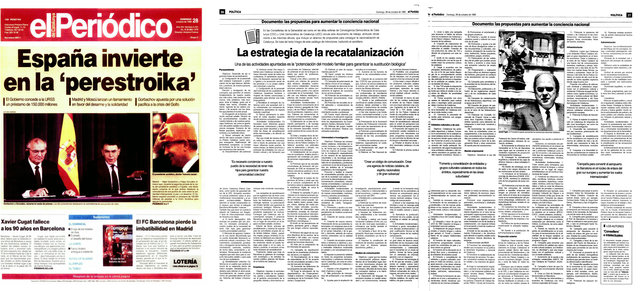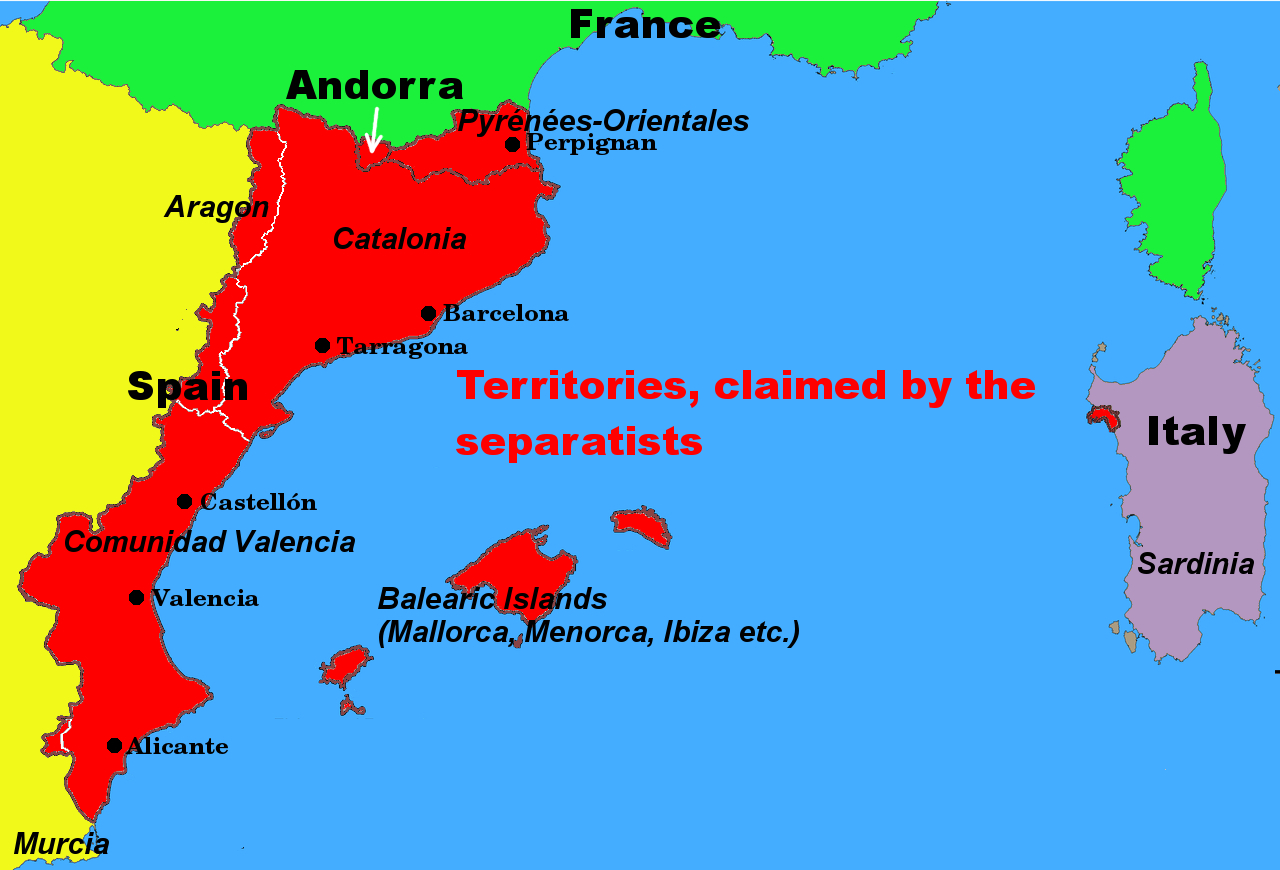A comparison
Referendums in Spain and Ukraine
September 30, 2022
In 2017, a referendum was held in Spain in the autonomous region of Catalonia. The separatists wanted a complete separation from Spain and to establish their own state.
In the last days of September this year, a referendum was held in the Donbass, made up of the two states of Donetsk and Lugansk there, which have already separated from the state of Ukraine in 2014, are voting in a referendum on whether they want to join the Russian Federation, similar to the accession of the GDR (East Germany) to the Federal Republic of Germany.
A comparison of the referendums can shed light on the political situation and intentions of the Catalan separatists.
What both referenda have in common is that they are and were accompanied by a massive propaganda effort. Of course, a comparison is difficult and never flawless.
But when no comparison is possible, propaganda can work best. Hence also the banning of enemy broadcasters (like BBC) under Hitler or the censorship in „social“ media or even the banning of alternative media today.
The following comparison should therefore only serve to contrast measures and events surrounding the Ukrainian and Catalan referendums.
In the heated situation of these days, it must unfortunately be emphasised: This comparison is not an attempt to take a position on the war against Russia. If you want to try to understand better, I recommend the opinions of neutral military experts such as the Swiss colonels Jaques Baud[1] and Ralph Bossard[2] or the Austrian colonel Dr. Markus Reisner[3].
| | | | | Separation from Spain | Integration into Russia | Legality | Not legal Since states regard their borders as inviolable, both from within and without, any referendum on separation of state territory usually requires the consent of the central government. This is usually not given. See the example of the German Federal Constitutional Court on the referendum on Bavaria's withdrawal from the FRG. | The two people's republics in the Donbass, Lugansk and Donbass, had already separated in 2014 after the coup d'état (Maidan) against the constitutional order in Ukraine. The referendum now taking place also took place in two other oblasts (provinces) and refers to an inegration of 4 regions into Russia. All this is, of course, illegal from Kiev's point of view. | International recognition | To my knowledge, the referendum was not recognised by any state. Only some regional authorities with their own separatist ambitions expressed their recognition. | The People's Republics were originally recognised only by Syria and North Korea. In February 2022, Russia pronounced its recognition. In the near future, recognition and expected incorporation into Russia is expected from other states. | The use of force | Police | Military and fascist gangs | Victims | Some injured and mock victims, because those who were scared when they saw police operations on TV were also counted | From 2014. when the Donbass separated, until the invasion of Russian troops in 2022, about 14,000 dead. Among them many civilians and children. Since Russia's invasion, shelling from NATO-supplied weapons have killed and injured scores of civilians every day.[4] | Official languages | Catalonia officially has three official languages. In schools, the Catalan government does not even tolerate a 25% teaching quota for Spanish, although the mother tongue of the majority of Catalans is Spanish and both the Catalan and Spanish supreme courts require this minimum of 25%. | The constitutions of the two Donbass republics list Ukrainian and Russian as official languages [5], while Kiev bans Russian. The proportion of the population who declare Russian as their mother tongue is over 80% in the Donbass and around 30% in Western Ukraine | Election observers | Many international election observers present, but not recognised by the Spanish state. See also statement by B.v. Grünberg, lawyer, German social democrat and election observer. No attacks on election observers or journalists are known. | Election observers from many nations. Election observers from the West lose their jobs. Two examples: here and here. In the referendum area, the staging areas of election observers and journalists were spied on and targeted with HIMARS missiles supplied by the US government. | News coverage | State-affiliated media in Germany tend to report in favour of the Spanish central government, left-wing media tend to report positively towards the separatists. As late as 2017, some media are even capable of self-criticism after falling for the separatists' propaganda. Examples are the Washington Post and the British Guardian | In Western state-affiliated media, reports are predominantly full of negative allusions. The German news (Tagesschau) even stoops to calling the Lugansk and Donetsk People's Republics „self-proclaimed“[6] and another state owned TV station spreads fake-news.[7] In Russia, the reporting will be predominantly positive, unfortunately I don't know Russian. | Votes/Result | Majority in favour of separation. Doubts about the result due to low turnout and actual and suspected intimidation of votes by both Spanish police and fanatical separatists. | Overwhelming majorities in favour of separation and/or integration into Russia. Doubts about the result because most pro-Ukrainians had already fled the People's Republics. |
Position of the Catalan separatists on the referendum in Ukraine
It is my impression that Catalan separatists have spoken positively about every referendum in favour of independence and separation from a state, with only one exception: Tabarnia! This is the region of Tarragona and Barcelone where politicians have declared that they would secede from Catalonia if Catalonia became independent from Spain.Footnotes
Catalan separatists had complained massively about the Spanish state in 2017 in view of the police action against their referendum, repeated accusations of fascism were made. Complaints or protests by the Catalan separatists about Kiev Ukraine's actions against the separatists have not come to my attention so far.
Should Ukraine be the second exception for the separatists, where even the extremely brutal crackdown finds the OK of the sepratists? Does silence mean approval? According to El Mundo of 27 September, the only statement on the subject these days refers to Canada: Catalan President „Aragonès is inspired by Canada“ to propose an agreement for a referendum to the state.
For German interviews and articles, I recommend having them translated by DeepL. Not perfect, but pretty good.
[1] German interview and english interview
[2] Colonel i.G. Ralph Bossard
[3] Colonel Dr. Markus Reisner
[4] It should not be concealed that Russia's invasion also requires civilian victims. However, these are not directly linked to the referendum.
[5] The Language issue in Ukraine, published 2012 in Warsaw, by Tadeusz A. Olszański
[6] Which state do you think is not self-proclaimed? Was the USA appointed by the English king back then or did it appoint itself with a constitution after its separatist liberation struggle?
[7] The NDR (German state owned TV station) had falsely reported that Western election observers had not been invited to the referendum in Ukraine. Read details in the article Mock reports on „mock referendums“.
| | | | Click here to subscribe or cancel your subscription |
Myths and deceptions of Catalan nationalism

Here you'll find the translation
The strategy of recatalanization
 1980 the Spanish journal "El Periodico" published a secret document about the strategy of the Catalan government. It shows in a frightening way the actual spiritual world of the separatist leaders.
1980 the Spanish journal "El Periodico" published a secret document about the strategy of the Catalan government. It shows in a frightening way the actual spiritual world of the separatist leaders.Now it is available in english translation.
Pancatalanism
the separatist's imperial claim
 The Catalan government exports the conflict into communities with Catalan population, supporting all efforts of the separatists including financial means to destroy Spain.
The Catalan government exports the conflict into communities with Catalan population, supporting all efforts of the separatists including financial means to destroy Spain. An important tool is the establishment of a language dictatorship that is not afraid to use the same means as Franco.
Separatist indoctrination

Click here to read the study
Language imposition and democracy

An essay in 6 parts on the potentially violent effect of language imposition containing contributions from South Africa, Catalonia, Ukraine and France.
go to part 1
Publications
 The title says: "Catalonia, a conflict is exported. Insights of a migrant"
The title says: "Catalonia, a conflict is exported. Insights of a migrant"Sorry, up to now, this book is only available in German. However, drop us a line, if you are interested to learn more Contact.
